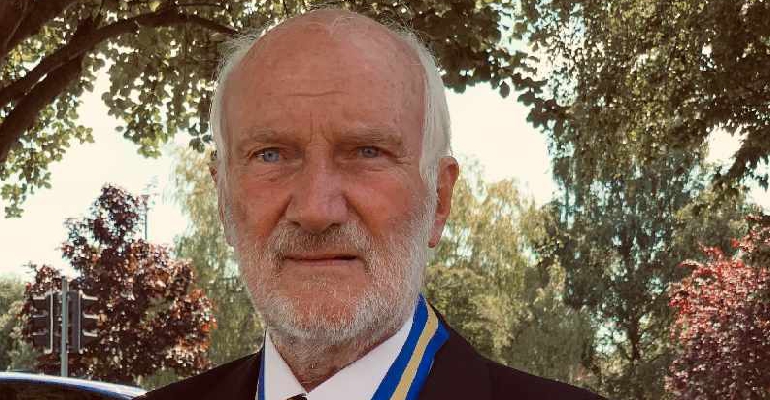Dear Reader: The year is fast running to its end. Halloween was great with the most amazing exhibited pumpkins I've seen in a long time. My own garden and our local allotments have done especially well this year. Especially the courgettes, pumpkins and runner beans, at which I seemed to excel. Next year, weather permitting my grandson wants to exhibit them in our local horticultural show; although by next year he'll have changed his mind!
The number of families growing their own fresh fruit and veg has ‘grown’, not just because of the economic situation but because there is an unstoppable interest in how our food is grown, prepared and concern about the vast range of chemicals used in their production. Our King, Charles, over forty years ago was championing organic farming and the need to look after our food supplies; nurture the land; support all non-invasive/chemical production methods at all stages of the food that we produce and eat. At that time it was deeply unpopular amongst some sectors of population, (my own thoughts were, it was usually with organisations that had vestige interests in a quick return on productivity), and such opinions as those expressed by the then Prince, were dismissed in favour of increase use chemical fertilisers and chemically aided food growing. Say no more! To return to the pumpkins I was asked to judge the best local pumpkin cut out competition, there were some amazing exhibits even more pleasing were the number of younger people entering and just how imaginative the exhibits were.
Halloween over, I have always enjoyed Guy Fawkes Night, perhaps it's my age. But I still enjoy the tradition of fireworks, the fire, baking potatoes in the embers and playing ‘silly games’ and singing well into the night. Whilst I appreciate the need to be careful and to act responsibly on bonfire night and on other such occasions, it would be a pity that if the few remaining traditional holidays that we have left are lost in the annuals of time.
Having said that, the damage caused, this summer, by portable BBQs, due to people acting irresponsible has probably been the worst on record. I would like to extend a really big vote of thanks to the groups of local volunteers, all over the Island, but particularly those in Ryde who have cleared up the rubbish left behind by trippers and the debris brought in by the tide. There is still an enormous amount of single use plastic and other detritus floating in our seas. Non-smoking campaigns, use of seat belt and other public health and safety measures have worked.
So why not on litter? It needed effort and willingness, both by successive governments and other public bodies, if it had, it could then work! We need a sustained approach to prevent littering and people not clearing up after themselves, and it needs to be seen as public enemy number one. The Island is fortunate to have small groups of dedicated individuals who clear up some of our most scenic beaches and rural areas; unlike my latest mainland visit to Oxford, where lay-bys and roads were used as litter bins. Pity the poor people who live close by!
This leads on to my next gripe: vandalism. Ryde like other areas, including other Island seaside towns, ‘suffers from mindless acts of vandalism’. This has included graffiti, rubbish dumping, smashing of lights, breaking windows, especially in uninhabited buildings and defacing residential
property.
Graffiti is a very perverse type of vandalism costing both ratepayers and householders huge amounts of money. Although sometimes not realised, vandalism is a crime! The Office for National Statistics is undertaking a Crime Survey for England and Wales. Households are randomly selected. It's not possible to ask everyone; a sample of private addresses is selected from a list held by Royal Mail. Interestingly younger members of the household, aged between 10-15 years, are also invited to complete a shorter questionnaire, their opinion and experiences are essential if we are to paint an accurate picture of our present day society. Permission is always sought from parent or guardian before anybody under the age of 18 is asked to take part.
Also no one has to take part in the survey but I would ask anybody in Ryde, who has been selected, to take part and to join in. It's important, whether or not you have suffered or experienced any form of crime, to take part. Looking to the future, a group of us looked to the past to see how we could add to supporting the police, today. Our past, what was available to society as a whole then, which does not exist today. It was an informative discussion where we recognised that communities, especially in the 70/90s had more people on the ‘ground’ at grass roots level. Open spaces such as local recs, parks, beaches, etc. had people employed to patrol, clean up and, where gated, lock up. Parks, in particular had paid park keepers, who often, not only learnt on the job as horticulturist, but patrolled the parks keeping children safe and were a presence, on the ground which gave folks a feeling of safety. This was replicated by the daily delivery of milk and groceries, by regular, known delivery people. These people were able to spot if something was ‘odd’ or out of place in the house or area they were working; again regular, known people visiting each house on their ‘Rounds’, they were encouraged to report if mail, bottles etc. were piling up, or if they were concerned about a member of the household. I have been told that this is often no longer the case. ‘Efficiency’, ‘smart working’ taking control; park keepers and others of that ilk, have generally disappeared to be replaced by private contractors.
These people have specified itineraries and are instructed to keep only to contract. This is the same for many other local type jobs. Privatisation and contractors replacing so many jobs once held by local people on the ground, who had a sense of belonging and pride in their work. We are
told that police on the beat are no longer necessary, that they provide a false sense of security, that policing can be done smarter and more efficiently by other methods. Maybe they do, but what is missing is that those same police constables, especially local police, were supported by a
whole series of local people carrying out on the ground, local jobs by working locally, keeping our society clean and safe. I have mentioned just a few: others include, road sweepers, building caretakers (not contractors), local youth organisers, guards on local trains, conductors on buses,
playground workers, school dinner folks and many others: all lost to the school of efficiency, smart working and money saving: in reality has it saved money? Our police and school teachers have become social workers and our social workers crisis managers!
Lastly, Ryde is already looking forward to Christmas. Decorations are going up and the shops are full of gifts. It's important that we all keep a sense of perspective. Gifts are in the giving and receiving, not how much they cost. Yours Charles Chapman.
Note: The views expressed in councillor columns are personal and do not necessarily represent those of the corresponding town and parish councils or Beacon Magazine.

